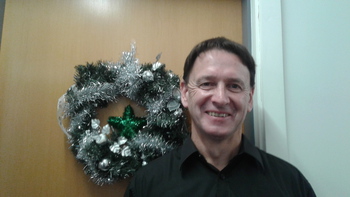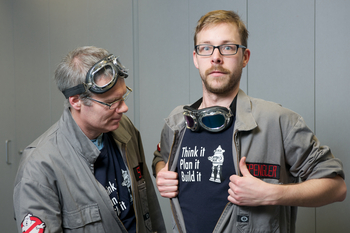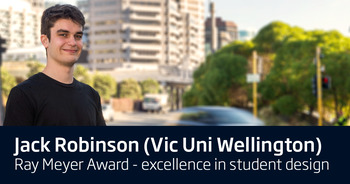News
A year in reflection from Dean of Engineering, Professor Dale Carnegie
21 Dec 2017 - 12:45 in Achievement
Dean of Engineering, Professor Dale Carnegie, wraps up a busy 2017 and prepares for 2018…
It’s December already (or maybe–finally) and as everything starts to wind down, I’d like to reflect on the past year and look towards the future. It’s certainly been a busy and extremely productive year for the Faculty of Engineering. We have achieved an enormous amount.
First to mention is our tremendous rate of growth. We are New Zealand’s fastest-growing Engineering faculty and we have seen a significant increase in student numbers. I am proud that Victoria University is a place where new ICT/High-tech students want to study. The thing I enjoy most about being Dean of such a buzzing faculty is seeing the development of students who come to us straight from secondary school, and watching them flourish into well-equipped graduates ready for the real world and all kinds of exciting careers. I am also proud of our exemplary pastoral care programme which provides to support to students when they need it. Other highlights of the past year include the addition of the Robinson Research Institute into our Faculty and the announcement of the Computational Media Innovation Centre, which will soon grow to a team of 30 students and staff. On top of this we have been busy supporting exciting developments in our new Cybersecurity and Renewable Energy programmes. These programmes are unique in Australasia and further cement Victoria’s status as the place to study in 2018. We are also seeing the potential for growth in other areas, such as Artificial Intelligence and Robotics. We’ll meet regularly next year to discuss how best to progress these. None of our achievements would have been possible without the passion, expertise, drive and determination of all of our staff. I would like to personally thank everyone in the Faculty for contributing so much to our success, and congratulate those who have received awards for teaching and/or research, best paper prizes, or distinguished fellowships. There is no doubt our students are getting the best tuition possible, and at the cutting-edge of technology. After such a full on year, I encourage staff and students to take a well-deserved break over the festive season - and take the opportunity to regroup and refresh for the New Year. So again, thank you everyone. You have made the Faculty of Engineering a fantastic place to work and study. I look forward to seeing you all in the New Year.
It’s December already (or maybe–finally) and as everything starts to wind down, I’d like to reflect on the past year and look towards the future. It’s certainly been a busy and extremely productive year for the Faculty of Engineering. We have achieved an enormous amount.
First to mention is our tremendous rate of growth. We are New Zealand’s fastest-growing Engineering faculty and we have seen a significant increase in student numbers. I am proud that Victoria University is a place where new ICT/High-tech students want to study. The thing I enjoy most about being Dean of such a buzzing faculty is seeing the development of students who come to us straight from secondary school, and watching them flourish into well-equipped graduates ready for the real world and all kinds of exciting careers. I am also proud of our exemplary pastoral care programme which provides to support to students when they need it. Other highlights of the past year include the addition of the Robinson Research Institute into our Faculty and the announcement of the Computational Media Innovation Centre, which will soon grow to a team of 30 students and staff. On top of this we have been busy supporting exciting developments in our new Cybersecurity and Renewable Energy programmes. These programmes are unique in Australasia and further cement Victoria’s status as the place to study in 2018. We are also seeing the potential for growth in other areas, such as Artificial Intelligence and Robotics. We’ll meet regularly next year to discuss how best to progress these. None of our achievements would have been possible without the passion, expertise, drive and determination of all of our staff. I would like to personally thank everyone in the Faculty for contributing so much to our success, and congratulate those who have received awards for teaching and/or research, best paper prizes, or distinguished fellowships. There is no doubt our students are getting the best tuition possible, and at the cutting-edge of technology. After such a full on year, I encourage staff and students to take a well-deserved break over the festive season - and take the opportunity to regroup and refresh for the New Year. So again, thank you everyone. You have made the Faculty of Engineering a fantastic place to work and study. I look forward to seeing you all in the New Year.
Postdoctoral Research Fellow: Introducing Adrian Pekar to ECS
21 Dec 2017 - 08:52 in Achievement
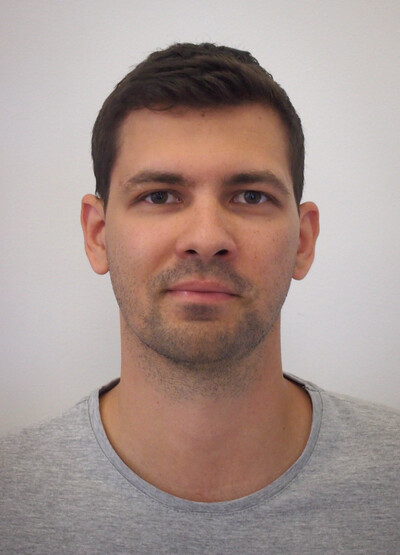 Name? Adrian Pekar.
Born in? Kralovsky Chlmec, Slovakia.
Lived in? Slovakia, Hungary, Austria, New Zealand.
First job? Data Centre and Network Function Virtualization Engineer.
Position at VUW? Postdoctoral Research Fellow.
Key research interests? Network Traffic Classification, Management and Engineering, QoS, IPFIX/NetFlow, Software Defined Networking, Data Centre and Network Function Virtualization.
Most looking forward to at VUW? To give and to receive! That is, to share my expertise and knowledge while developing my career.
Where can people find you at VUW? AM407.
Why Wellington? See the quote to live by below!
Favourite movie? The Secret Life of Walter Mitty.
Favourite food? Cabbage soup (Slovak: kapustnica).
Quote to live by? “I rarely end up where I was intending to go, but often I end up somewhere I needed to be” (Douglas Adams).
Name? Adrian Pekar.
Born in? Kralovsky Chlmec, Slovakia.
Lived in? Slovakia, Hungary, Austria, New Zealand.
First job? Data Centre and Network Function Virtualization Engineer.
Position at VUW? Postdoctoral Research Fellow.
Key research interests? Network Traffic Classification, Management and Engineering, QoS, IPFIX/NetFlow, Software Defined Networking, Data Centre and Network Function Virtualization.
Most looking forward to at VUW? To give and to receive! That is, to share my expertise and knowledge while developing my career.
Where can people find you at VUW? AM407.
Why Wellington? See the quote to live by below!
Favourite movie? The Secret Life of Walter Mitty.
Favourite food? Cabbage soup (Slovak: kapustnica).
Quote to live by? “I rarely end up where I was intending to go, but often I end up somewhere I needed to be” (Douglas Adams).
Farewelling Elf Eldridge
19 Dec 2017 - 11:03 in Achievement
After years of outstanding service, Victoria’s School of Engineering and Computer Science (ECS) is sad to be farewelling one of its most well-loved lecturers.
In his time at ECS, Elf Eldridge has amassed an enthusiastic following comprising the students he has taught and nurtured since their first year, as well as being popular with his colleagues.
Elf first joined the School while finishing his PhD in Physics to take up a role in the outreach and pastoral care team. He was instrumental in inspiring high school students to study at ECS, then providing academic support for them when they arrived at university.
In 2015 Elf joined the permanent academic staff as a lecturer, with a unique vision for first-year engineering courses. Since early 2017 he has also served as the first-year programme director.
Elf says his favourite thing about working at ECS has always been students who have an appetite for knowledge, be it for games, programming, videos, machine learning, hacking, robotics—anything!
“First-years, in particular, are just as excited by new technology as I am. While they have a range of abilities, the common thing about them is that they are genuinely interested in learning new things and finding clever solutions to the problems they encounter.”
Elf also says the Faculty’s good sense of humour creates a unique learning environment.
“The students are comfortable enough to ask for help if they need it, but also to laugh it off if they or I make a mistake.” Head of School Dr Stuart Marshall says Elf will be sorely missed. “It is regrettably time to say goodbye to an extremely valued member of our School community,” says Dr Marshall. “Elf has been an outstanding and engaging colleague and has contributed highly to our School culture, never afraid to put forward ideas and suggestions for improvement.” Elf’s ‘Lecturer of the Year’ award from the Victoria University of Wellington Students' Association (VUWSA) in 2016 is also a testament to his commitment to his students and inspiring teaching style, says Dr Marshall. “Elf won this award for his hard work, dedication and engagement with students, and he is incredibly well-liked by students and staff alike. We wish Elf all the best for the future and reflect on the times we have shared with him.” Elf also has a busy 2018 planned. He hopes to spend time at the beach, perform in a circus show and tramp in the Andes. He also intends to keep running robotics outreach events and public science outreach. “That should be enough to keep me busy for the short term!”
Elf also says the Faculty’s good sense of humour creates a unique learning environment.
“The students are comfortable enough to ask for help if they need it, but also to laugh it off if they or I make a mistake.” Head of School Dr Stuart Marshall says Elf will be sorely missed. “It is regrettably time to say goodbye to an extremely valued member of our School community,” says Dr Marshall. “Elf has been an outstanding and engaging colleague and has contributed highly to our School culture, never afraid to put forward ideas and suggestions for improvement.” Elf’s ‘Lecturer of the Year’ award from the Victoria University of Wellington Students' Association (VUWSA) in 2016 is also a testament to his commitment to his students and inspiring teaching style, says Dr Marshall. “Elf won this award for his hard work, dedication and engagement with students, and he is incredibly well-liked by students and staff alike. We wish Elf all the best for the future and reflect on the times we have shared with him.” Elf also has a busy 2018 planned. He hopes to spend time at the beach, perform in a circus show and tramp in the Andes. He also intends to keep running robotics outreach events and public science outreach. “That should be enough to keep me busy for the short term!”
Software hackathon hits NZ Cricket Museum’s challenges for six
15 Nov 2017 - 10:10 in Achievement
Software Development Masters students from the Wellington ICT Graduate School are on the way to solving the NZ Cricket Museum’s challenges after a two-day hackathon.
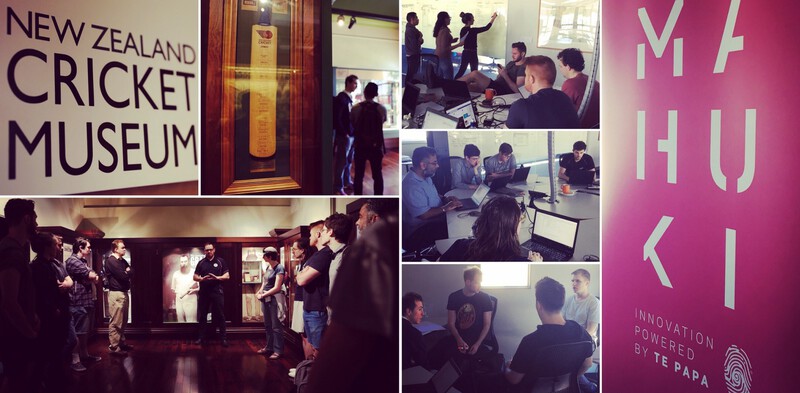 If two heads are better than one when solving tricky problems, then 30 heads must surely be even better.
Over Thursday and Friday [November 9–10] the 30 Master of Software Development students, completing a one-year conversion Masters from the Wellington ICT Graduate School, teamed up to solve challenges put forward by the Wellington-based New Zealand Cricket Museum.
The two-day hackathon — essentially a brainstorming session to come up with new technology ideas and solutions — builds on the students’ learnings from their day-to-day studies.
“Hackathons allow students to use what they have just learned to solve real problems in innovative ways. They are given problems and then see how they can solve them using the skills and technologies they have learned”, says Dr Karsten Lundqvist, a Senior Lecturer at Victoria University.
During this hackathon students considered two main issues. Firstly, how to make static displays more dynamic by better linking the items back to the action that made them worth collecting, and also how to streamline the software museums use to manage their collections.
If two heads are better than one when solving tricky problems, then 30 heads must surely be even better.
Over Thursday and Friday [November 9–10] the 30 Master of Software Development students, completing a one-year conversion Masters from the Wellington ICT Graduate School, teamed up to solve challenges put forward by the Wellington-based New Zealand Cricket Museum.
The two-day hackathon — essentially a brainstorming session to come up with new technology ideas and solutions — builds on the students’ learnings from their day-to-day studies.
“Hackathons allow students to use what they have just learned to solve real problems in innovative ways. They are given problems and then see how they can solve them using the skills and technologies they have learned”, says Dr Karsten Lundqvist, a Senior Lecturer at Victoria University.
During this hackathon students considered two main issues. Firstly, how to make static displays more dynamic by better linking the items back to the action that made them worth collecting, and also how to streamline the software museums use to manage their collections.
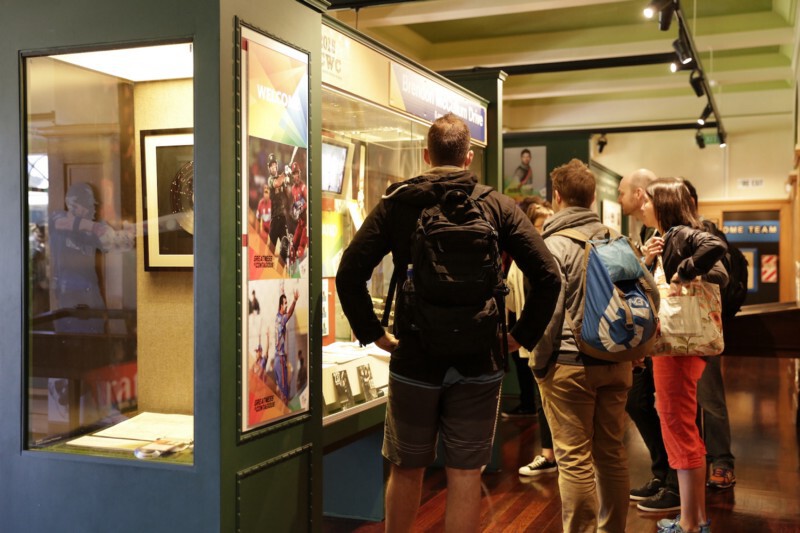 “These problems are common to all museums, not just us and not just small museums,” says the NZ Cricket Museum Director, Jamie Bell.
“Museums are about providing context and connection. With our collection being focused on something as dynamic as cricket, we want to find ways to improve the connection between an object that sits in a static museum display and the on-field action that made it worth collecting.
“For example, we have many cricket bats that were used in significant matches — like the one Grant Elliott used to hit New Zealand to a Cricket World Cup final. How do we recreate the hair-on-the-back-of-the-neck feeling from when that bat was used in that moment?”
Jamie also sought the developers’ help for when the items get collected and logged in the museum’s database.
“Most museums use one of three or four collection management systems, but they all have the same issue — they’re too complicated, especially for volunteers or novice students. With about 150 fields available in the software, where most museums will only use a small proportion of these, the breadth of information requested can be daunting.”
Photographs are also important, particularly in an increasingly digital world, Jamie says.
“We need to photograph our items to detail their condition and to make them available for researchers. We’re also increasingly moving our museum experience online so we want to make more of our items publicly accessible via our website.
“But there are currently too many steps between taking a photograph and uploading it. It’s time-consuming and clunky, so I asked the students to find a solution.
“I really like working with students, giving them an opportunity to develop their skills. I like their ability to think laterally,” Jamie says.
Mahuki, Te Papa’s innovation accelerator hub, sponsored the hackathon, which is a part of the students’ study programme. As well as nutritionally fuelling the students — a vital element in a hackathon — Mahuki’s representatives helped assess the viability of the teams’ concepts alongside Jamie Bell at the end of the second day.
After two days of working in teams, devising and designing ideas, the winners were announced.
The winners were team Crickmo, who developed a geo-location app to create an interactive mobile treasure hunt for fans at Wellington’s Basin Reserve.
“These problems are common to all museums, not just us and not just small museums,” says the NZ Cricket Museum Director, Jamie Bell.
“Museums are about providing context and connection. With our collection being focused on something as dynamic as cricket, we want to find ways to improve the connection between an object that sits in a static museum display and the on-field action that made it worth collecting.
“For example, we have many cricket bats that were used in significant matches — like the one Grant Elliott used to hit New Zealand to a Cricket World Cup final. How do we recreate the hair-on-the-back-of-the-neck feeling from when that bat was used in that moment?”
Jamie also sought the developers’ help for when the items get collected and logged in the museum’s database.
“Most museums use one of three or four collection management systems, but they all have the same issue — they’re too complicated, especially for volunteers or novice students. With about 150 fields available in the software, where most museums will only use a small proportion of these, the breadth of information requested can be daunting.”
Photographs are also important, particularly in an increasingly digital world, Jamie says.
“We need to photograph our items to detail their condition and to make them available for researchers. We’re also increasingly moving our museum experience online so we want to make more of our items publicly accessible via our website.
“But there are currently too many steps between taking a photograph and uploading it. It’s time-consuming and clunky, so I asked the students to find a solution.
“I really like working with students, giving them an opportunity to develop their skills. I like their ability to think laterally,” Jamie says.
Mahuki, Te Papa’s innovation accelerator hub, sponsored the hackathon, which is a part of the students’ study programme. As well as nutritionally fuelling the students — a vital element in a hackathon — Mahuki’s representatives helped assess the viability of the teams’ concepts alongside Jamie Bell at the end of the second day.
After two days of working in teams, devising and designing ideas, the winners were announced.
The winners were team Crickmo, who developed a geo-location app to create an interactive mobile treasure hunt for fans at Wellington’s Basin Reserve.
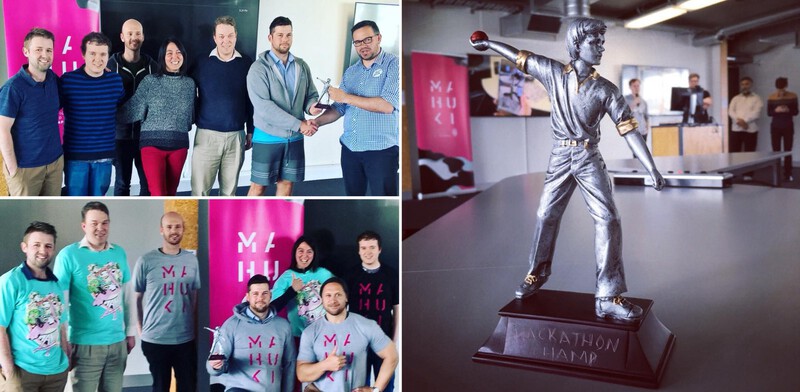 Acting Director of the Wellington ICT Graduate School Susan Andersen congratulated the students on their hard work.
Acting Director of the Wellington ICT Graduate School Susan Andersen congratulated the students on their hard work.
“This is a great opportunity for our students to build a Proof of Concept that can then grow into a start-up idea. “This is where Mahuki can get involved, as afterwards the students can take what they have and apply to be part of the next Mahuki incubator programme, beginning in August 2018.” NZ Cricket Museum Director Jamie Bell says he was impressed with the concepts and solutions the students put forward. “All of the teams came up with unique solutions to the problems put to them. Some focused on a core element and developed a simple solution, others created an engaging experience related to the Museum, and some thought laterally to how a concept could fit our brief but develop into a product in its own right. “It’s been great for the Museum to be part of this hackathon, following on from our burgeoning relationship with Mahuki and some of the teams there. The creativity and skillset these students have shown offers an exciting future for museums, heritage, and storytelling.” nzcricketmuseum.co.nz Our 12-month Master of Software Development (MSwDev) is open to anyone with a Bachelor’s degree. This conversion programme has been designed for people from non-information technology disciplines who want to become software developers. Next intake for MSwDev is July 2018 — June 2019. Applications for 2018 are open now. Book an advice session to find out more about the programmes we offer.

Master of Software Development students visit the NZ Cricket Museum with Museum Director, Jamie Bell (below left), and work in teams to develop new tech ideas and solutions for the Museum.

How do we make static displays more dynamic? Masters students check out objects on display at the NZ Cricket Museum.

The winning team, Crickmo, accept their trophy from NZ Cricket Museum Director, Jamie Bell (above left) and pictured with Mahuki’s Outreach Coordinator, Sulu Fiti (below left). The Hackathon Champ trophy stands in full glory (right) while students present their final concepts to the judges.
“This is a great opportunity for our students to build a Proof of Concept that can then grow into a start-up idea. “This is where Mahuki can get involved, as afterwards the students can take what they have and apply to be part of the next Mahuki incubator programme, beginning in August 2018.” NZ Cricket Museum Director Jamie Bell says he was impressed with the concepts and solutions the students put forward. “All of the teams came up with unique solutions to the problems put to them. Some focused on a core element and developed a simple solution, others created an engaging experience related to the Museum, and some thought laterally to how a concept could fit our brief but develop into a product in its own right. “It’s been great for the Museum to be part of this hackathon, following on from our burgeoning relationship with Mahuki and some of the teams there. The creativity and skillset these students have shown offers an exciting future for museums, heritage, and storytelling.” nzcricketmuseum.co.nz Our 12-month Master of Software Development (MSwDev) is open to anyone with a Bachelor’s degree. This conversion programme has been designed for people from non-information technology disciplines who want to become software developers. Next intake for MSwDev is July 2018 — June 2019. Applications for 2018 are open now. Book an advice session to find out more about the programmes we offer.
Victoria students vying for national title in IT Challenge
30 Jun 2017 - 10:27 in Achievement
In between studying and sitting exams, eight students are preparing to take on other tertiary students in the annual National MYOB IT Challenge in Auckland next week.
The students represent the two winning teams of the preliminary round at Victoria run by cloud-based business solution provider MYOB.
The preliminary competition for Victoria students in May gave teams five days to develop a technology solution to a real-world business problem. Each team then presented their solution and business plans to a panel of judges from MYOB and professional services firm PricewaterhouseCoopers.
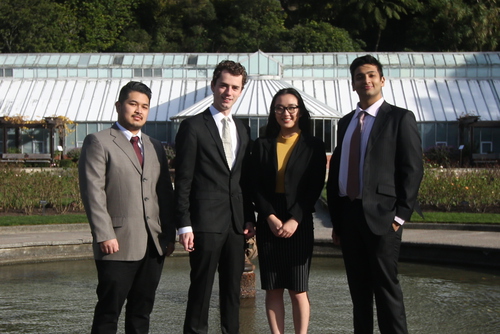 L-R: Nanda, Liam, Mona and Adiraj
Team ‘Mind Me’ shared the top honours after impressing judges by developing a virtual reality assistant. The assistant is designed to help people navigate cloud-based accounting software by providing advice and answering questions from the software’s users.
‘Mind Me’ consists of third-year Engineering students Liam Dennis, Mona Ruan, Adiraj Gupta and Nanda Hibatullah.
Liam says the challenge demanded a range of skills including coding, business, marketing and presenting, in addition to their shared engineering background.
“You need to have a good skills across the board and everyone in the team was able to bring something different, like Mona for example, who was able to pitch the team’s concept to her employer as part of market validation.”
Liam and Adiraj are both also studying a Bachelor of Commerce and as well as contributing business knowledge, they had the extra advantage of being in the winning team of last year’s national competition.
L-R: Nanda, Liam, Mona and Adiraj
Team ‘Mind Me’ shared the top honours after impressing judges by developing a virtual reality assistant. The assistant is designed to help people navigate cloud-based accounting software by providing advice and answering questions from the software’s users.
‘Mind Me’ consists of third-year Engineering students Liam Dennis, Mona Ruan, Adiraj Gupta and Nanda Hibatullah.
Liam says the challenge demanded a range of skills including coding, business, marketing and presenting, in addition to their shared engineering background.
“You need to have a good skills across the board and everyone in the team was able to bring something different, like Mona for example, who was able to pitch the team’s concept to her employer as part of market validation.”
Liam and Adiraj are both also studying a Bachelor of Commerce and as well as contributing business knowledge, they had the extra advantage of being in the winning team of last year’s national competition.
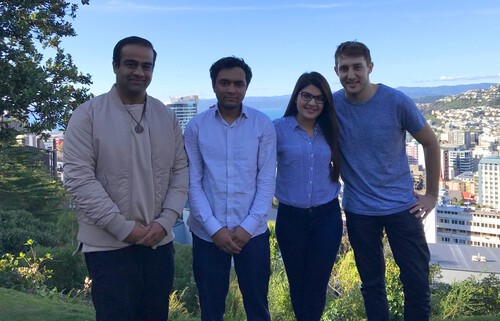 L-R: Nikkitesh, Dipen, Fatemah and Michael
The other winning team from Victoria ‘Team IV & CO’ comprises Bachelor of Commerce students Michael Kotlyar, Fatemeh Saleh and Nikkitesh Gurnani, and Software Engineering student Dipen Patel.
‘Team IV & CO’ secured their spot at the national final by designing an app called ‘MYOB Recruit’ that streamlines the recruitment process for small to medium businesses.
Michael says the app fills a gap in the market by being an “all-in-one app that organises finding the applicants, completing forms and finalising the contract”.
The app makes the hiring process easier, quicker and cheaper as businesses would no longer have to use multiple services.
Michael adds there’s still work to do ahead of nationals as they need to develop their prototype, refine their business plan and practise their presentation ahead of the finals.
Both teams are being flown to Auckland to compete in the national final against teams from University of Auckland, AUT and University of Canterbury, each hoping to pocket some of the $5,000 prize money.
L-R: Nikkitesh, Dipen, Fatemah and Michael
The other winning team from Victoria ‘Team IV & CO’ comprises Bachelor of Commerce students Michael Kotlyar, Fatemeh Saleh and Nikkitesh Gurnani, and Software Engineering student Dipen Patel.
‘Team IV & CO’ secured their spot at the national final by designing an app called ‘MYOB Recruit’ that streamlines the recruitment process for small to medium businesses.
Michael says the app fills a gap in the market by being an “all-in-one app that organises finding the applicants, completing forms and finalising the contract”.
The app makes the hiring process easier, quicker and cheaper as businesses would no longer have to use multiple services.
Michael adds there’s still work to do ahead of nationals as they need to develop their prototype, refine their business plan and practise their presentation ahead of the finals.
Both teams are being flown to Auckland to compete in the national final against teams from University of Auckland, AUT and University of Canterbury, each hoping to pocket some of the $5,000 prize money.
 L-R: Nikkitesh, Dipen, Fatemah and Michael
The other winning team from Victoria ‘Team IV & CO’ comprises Bachelor of Commerce students Michael Kotlyar, Fatemeh Saleh and Nikkitesh Gurnani, and Software Engineering student Dipen Patel.
‘Team IV & CO’ secured their spot at the national final by designing an app called ‘MYOB Recruit’ that streamlines the recruitment process for small to medium businesses.
Michael says the app fills a gap in the market by being an “all-in-one app that organises finding the applicants, completing forms and finalising the contract”.
The app makes the hiring process easier, quicker and cheaper as businesses would no longer have to use multiple services.
Michael adds there’s still work to do ahead of nationals as they need to develop their prototype, refine their business plan and practise their presentation ahead of the finals.
Both teams are being flown to Auckland to compete in the national final against teams from University of Auckland, AUT and University of Canterbury, each hoping to pocket some of the $5,000 prize money.
L-R: Nikkitesh, Dipen, Fatemah and Michael
The other winning team from Victoria ‘Team IV & CO’ comprises Bachelor of Commerce students Michael Kotlyar, Fatemeh Saleh and Nikkitesh Gurnani, and Software Engineering student Dipen Patel.
‘Team IV & CO’ secured their spot at the national final by designing an app called ‘MYOB Recruit’ that streamlines the recruitment process for small to medium businesses.
Michael says the app fills a gap in the market by being an “all-in-one app that organises finding the applicants, completing forms and finalising the contract”.
The app makes the hiring process easier, quicker and cheaper as businesses would no longer have to use multiple services.
Michael adds there’s still work to do ahead of nationals as they need to develop their prototype, refine their business plan and practise their presentation ahead of the finals.
Both teams are being flown to Auckland to compete in the national final against teams from University of Auckland, AUT and University of Canterbury, each hoping to pocket some of the $5,000 prize money.
Wellington scientists getting hybrid planes off the ground
26 Jun 2017 - 15:27 in Achievement
A team of Victoria University of Wellington researchers is hoping to use their technology to help build the world’s first hybrid-electric jet plane.
Victoria’s Robinson Research Institute is an international leader in the field of superconductivity—a key mechanism needed to develop cleaner aviation technologies, says principal engineer and Deputy Director Dr Rod Badcock.
“Flying is the most climate-intensive form of transport and contributes hugely to global warming. Emissions from planes have grown by 75 percent since 1990, double the rate of other sectors of the economy. It’s important that a cleaner alternative is found—and fast.
“Electric vehicles have been around for a long time. However, electric planes pose a bigger challenge as they will require very high-power propulsion systems which are subject to stringent weight constraints. Existing electrical machines are simply too heavy.
“The only feasible approach is high-torque, high-speed machines that employ high temperature superconductors.”
The Institute’s international reputation for superconductor science and engineering has caught the eye of NASA and the United States Air Force, which are part of global efforts to develop the world’s first hybrid-electric jet plane.
Three researchers from the Institute have been invited to talk to a NASA special session in Wisconsin next month, about the development of electric aircraft using superconducting technology. Two members of the Institute have been part of the team working on NASA’s Electric Aircraft Technology Roadmap.
A hybrid-electric aircraft would increase aircraft fuel efficiency by more than 33 percent over today’s jet engines, by employing high-speed electric motors to drive aerodynamically optimised turbo-fans.
“We’d like to take our technology to the next step, and develop a motor for a Boeing 737-sized passenger plane. This will use an electric drive-train to connect high-speed electric motors with a fuel-powered generator running at maximum efficiency. A superconducting motor will deliver the all-important power-to-weight ratio,” says Dr Badcock.
“We have collaborations with experts in the United States, United Kingdom and Japan. We’re all using our knowledge and technology to make it a reality.”
Dr Badcock works at Victoria’s Lower Hutt-based Robinson Research Centre alongside a skilled team of engineers and applied physicists, which includes Drs Chris Bumby, Simon Granville, Zhenan Jiang and Stuart Wimbush.
The Institute’s work on high temperature superconductors has also led to a myriad of other potential applications, including high-speed trains, large wind generators, and magnetic resonance imaging (MRI) systems.
Helping to build the world’s first hybrid-electric jet plane would have a considerable impact on the New Zealand economy, says Dr Badcock.
“New Zealand depends on aviation. Whether we’re exporting high-value products to the world, or welcoming tourists to our shores, we rely on airlines to serve us. International restrictions on air travel would have a devastating effect.
“Furthermore, New Zealand must implement a step-change in fuel efficiency to maintain emission levels promised in the Paris Agreement—a 30 percent improvement in aircraft efficiencies is required by 2035. This would help protect our growing international tourism industry that brings $12 billion into the economy, and save New Zealand $276 million a year in fuel.
“Developing new, cleaner aviation technology is a demanding goal, but it offers potentially transformative outcomes for New Zealand. There are opportunities for local companies to contribute to and earn from this pressing global problem, including the growth of a new export market that manufactures specialised pieces of machinery.”
Welcoming Fanglue Zhang to Computer Graphics
16 Jun 2017 - 09:56 in Achievement
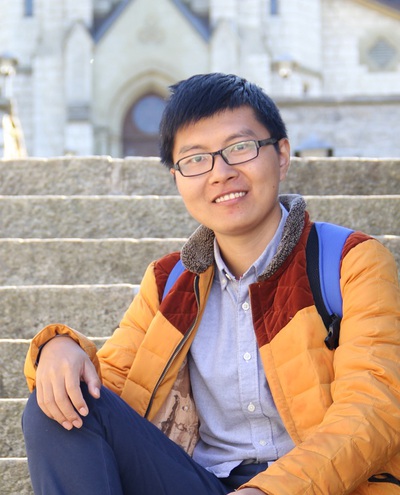 The School of Engineering and Computer Science (ECS) is delighted to welcome Dr Fanglue Zhang who has arrived from China to take up the position of computer graphics lecturer.
Fanglue holds a doctoral degree from Tsinghua University where he subsequently spent two years as a post-doctoral researcher. His research interests include computer graphics, computational photography, and image and video analysis and processing.
“Wellington is a great city with beautiful scenery and friendly people”, says Fanglue. “I hope I can make a valuable contribution to teaching and research at Victoria”.
Professor Neil Dodgson, Director of ECS’s computer graphics programme, is thrilled to welcome Fanglue to the team.
“Fanglue comes to us from the top university in China for science and engineering, and has been publishing in the best research journals for computer graphics for several years”, says Neil. “He brings complementary expertise to the research group and together we expect to do great things!”
The School of Engineering and Computer Science (ECS) is delighted to welcome Dr Fanglue Zhang who has arrived from China to take up the position of computer graphics lecturer.
Fanglue holds a doctoral degree from Tsinghua University where he subsequently spent two years as a post-doctoral researcher. His research interests include computer graphics, computational photography, and image and video analysis and processing.
“Wellington is a great city with beautiful scenery and friendly people”, says Fanglue. “I hope I can make a valuable contribution to teaching and research at Victoria”.
Professor Neil Dodgson, Director of ECS’s computer graphics programme, is thrilled to welcome Fanglue to the team.
“Fanglue comes to us from the top university in China for science and engineering, and has been publishing in the best research journals for computer graphics for several years”, says Neil. “He brings complementary expertise to the research group and together we expect to do great things!”
It just goes to show
26 May 2017 - 09:14 in Achievement
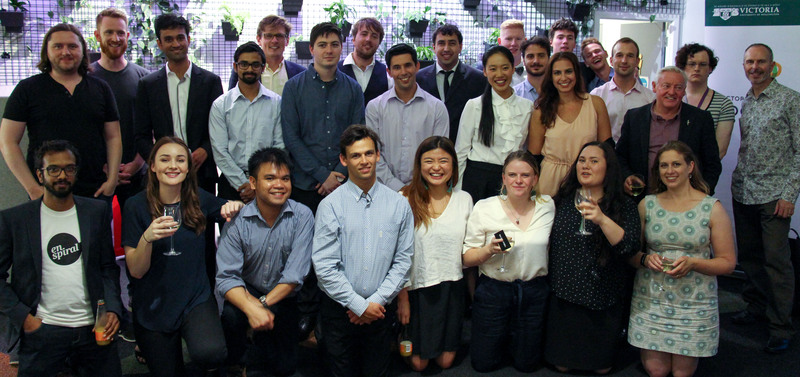 Engineering and Computer Science graduates Glen Peek and John Gelbolingo were two of the innovative entrepreneurs who took part in the Victoria Entrepreneur Bootcamp Final Showcase recently, taking their smart business ideas from the whiteboard to the tech world with the help of Viclink, Victoria’ commercialisation office…
It was the show that had it all—from romance and entertainment, to altruism and humanitarianism—and it was all in the name of helping Victoria graduates to think like entrepreneurs.
The Victoria Entrepreneur Bootcamp Final Showcase represented the culmination of 12 weeks of intense exploration and discovery by ten teams of Victoria’s most innovative graduates and students, who presented their range of business ideas to a packed audience at the BizDojo in February.
“Each team starts out with an idea that they hope to turn into a business,” explains Emily Grinter, Viclink’s Entrepreneurship Manager, and Programme Manager of the Victoria Entrepreneur Bootcamp. “Whether they achieve that or not is not actually our primary goal—it’s the learning along the way that is important. We want to grow these young people into entrepreneurs who have the skills to take virtually any idea and work through the process to determine its viability.”
One of those ideas started out as a romantic gesture—“I wanted to find a way to leave messages for my girlfriend to collect around town”—but led Glen Peek to create ‘Stash’, an app that enables people to stash images, videos and text for others to find, anywhere in the world. While investigating different ways to create revenue from his product, Glen landed his first job—for Victoria University—delivering a digital scavenger hunt for students taking part in New Students' Orientation week. Stash is now available for download from Google Play and the App Store.
Also in the tech space, John Gelbolingo from Sweet Tea Interactive introduced his augmented reality app, which he is targeting at the GLAM (Galleries, Libraries, Archives and Museums) industry. “Museums can use it to engage visitors with their exhibitions, and help them to experience art in a new and different way,” says John. And because the app’s motion capture sensors enable people to virtually ‘try-on’ costumes or garments, the team is approaching New Zealand Fashion Week and the World of Wearable Arts (WOW) to discuss future opportunities to work together.
Wanting to help tertiary students to better manage their money was the initial motivation behind team Blume’s app, ‘Teller’; however, significant market research proved their prototype wasn’t viable. The team has since identified another potential avenue for the product, and is looking at partnering with a financial advisory firm who may use the app to improve the way it engages with its customers (who are also looking to manage their money more successfully).
Team Par’s mentor-matching idea gained ground after their market research survey of 500 mentors found that 40 percent of volunteer mentors were still waiting to be matched with mentees. Par’s programme enables mentoring organisations to manage their recruitment, training, matching and managing processes more quickly and efficiently, so they can stay focused on the people that they are striving to help. Already working with the Primary ITO, among others, they are interested in talking to anyone who has a mentor-matching problem to solve.
Lack of access to sanitary products in New Zealand has been a hot topic in the news for a while now, but team Dignity have used the Bootcamp experience to do something about it. Their business model involves selling corporate subscriptions for businesses to receive regularly deliveries of environmentally-friendly sanitary items—and for every pack bought, another is donated to schools, so that girls won’t have to miss school due to lack of sanitary products. The team has already signed up a number of Wellington businesses who see the service as aligning with their value of corporate social responsibility, while Dignity’s idea has also been picked up in Auckland by the NZ Herald.
Climate change is an issue that, for many, seems just too big to tackle, with no easy way to take meaningful action. Enter team Colibri, whose winning idea from Climathon 2016 is focused on enabling individuals to offset the carbon footprints of their purchases with a small contribution that goes towards local climate change mitigation projects. Given that one third of environmental impact occurs on our plates, the team is now talking with local cafes and restaurants about using the Colibri e-commerce platform to collect those contributions.
Other presentations included: a social gathering platform (FlockIn) to connect exercisers with others to work out with; a 24/7 marketing tool (Maax) which combines human knowledge with external data sources to anticipate which products customers want, and when; a drink straw (Majiic Juice) that flavours the water with fruit juice when sipped through, and a programme (Exchange Link) that enables Kiwi university students to study abroad stress-free.
“The students in this intake have shown really impressive dedication to the programme,” says Emily. “Every single participant has taken advantage of the awesome opportunities that are made possible by our partners and sponsors such as the BizDojo (who allow our teams to pretty much live there while Bootcamp is on), Deloitte Private, Chapman Tripp and 1st Assembly. We simply couldn’t do it without them.”
To find out more about the Victoria Entrepreneur Bootcamp please contact Emily Sullivan at emily.sullivan@viclink.co.nz
Engineering and Computer Science graduates Glen Peek and John Gelbolingo were two of the innovative entrepreneurs who took part in the Victoria Entrepreneur Bootcamp Final Showcase recently, taking their smart business ideas from the whiteboard to the tech world with the help of Viclink, Victoria’ commercialisation office…
It was the show that had it all—from romance and entertainment, to altruism and humanitarianism—and it was all in the name of helping Victoria graduates to think like entrepreneurs.
The Victoria Entrepreneur Bootcamp Final Showcase represented the culmination of 12 weeks of intense exploration and discovery by ten teams of Victoria’s most innovative graduates and students, who presented their range of business ideas to a packed audience at the BizDojo in February.
“Each team starts out with an idea that they hope to turn into a business,” explains Emily Grinter, Viclink’s Entrepreneurship Manager, and Programme Manager of the Victoria Entrepreneur Bootcamp. “Whether they achieve that or not is not actually our primary goal—it’s the learning along the way that is important. We want to grow these young people into entrepreneurs who have the skills to take virtually any idea and work through the process to determine its viability.”
One of those ideas started out as a romantic gesture—“I wanted to find a way to leave messages for my girlfriend to collect around town”—but led Glen Peek to create ‘Stash’, an app that enables people to stash images, videos and text for others to find, anywhere in the world. While investigating different ways to create revenue from his product, Glen landed his first job—for Victoria University—delivering a digital scavenger hunt for students taking part in New Students' Orientation week. Stash is now available for download from Google Play and the App Store.
Also in the tech space, John Gelbolingo from Sweet Tea Interactive introduced his augmented reality app, which he is targeting at the GLAM (Galleries, Libraries, Archives and Museums) industry. “Museums can use it to engage visitors with their exhibitions, and help them to experience art in a new and different way,” says John. And because the app’s motion capture sensors enable people to virtually ‘try-on’ costumes or garments, the team is approaching New Zealand Fashion Week and the World of Wearable Arts (WOW) to discuss future opportunities to work together.
Wanting to help tertiary students to better manage their money was the initial motivation behind team Blume’s app, ‘Teller’; however, significant market research proved their prototype wasn’t viable. The team has since identified another potential avenue for the product, and is looking at partnering with a financial advisory firm who may use the app to improve the way it engages with its customers (who are also looking to manage their money more successfully).
Team Par’s mentor-matching idea gained ground after their market research survey of 500 mentors found that 40 percent of volunteer mentors were still waiting to be matched with mentees. Par’s programme enables mentoring organisations to manage their recruitment, training, matching and managing processes more quickly and efficiently, so they can stay focused on the people that they are striving to help. Already working with the Primary ITO, among others, they are interested in talking to anyone who has a mentor-matching problem to solve.
Lack of access to sanitary products in New Zealand has been a hot topic in the news for a while now, but team Dignity have used the Bootcamp experience to do something about it. Their business model involves selling corporate subscriptions for businesses to receive regularly deliveries of environmentally-friendly sanitary items—and for every pack bought, another is donated to schools, so that girls won’t have to miss school due to lack of sanitary products. The team has already signed up a number of Wellington businesses who see the service as aligning with their value of corporate social responsibility, while Dignity’s idea has also been picked up in Auckland by the NZ Herald.
Climate change is an issue that, for many, seems just too big to tackle, with no easy way to take meaningful action. Enter team Colibri, whose winning idea from Climathon 2016 is focused on enabling individuals to offset the carbon footprints of their purchases with a small contribution that goes towards local climate change mitigation projects. Given that one third of environmental impact occurs on our plates, the team is now talking with local cafes and restaurants about using the Colibri e-commerce platform to collect those contributions.
Other presentations included: a social gathering platform (FlockIn) to connect exercisers with others to work out with; a 24/7 marketing tool (Maax) which combines human knowledge with external data sources to anticipate which products customers want, and when; a drink straw (Majiic Juice) that flavours the water with fruit juice when sipped through, and a programme (Exchange Link) that enables Kiwi university students to study abroad stress-free.
“The students in this intake have shown really impressive dedication to the programme,” says Emily. “Every single participant has taken advantage of the awesome opportunities that are made possible by our partners and sponsors such as the BizDojo (who allow our teams to pretty much live there while Bootcamp is on), Deloitte Private, Chapman Tripp and 1st Assembly. We simply couldn’t do it without them.”
To find out more about the Victoria Entrepreneur Bootcamp please contact Emily Sullivan at emily.sullivan@viclink.co.nz
Engineering Dean's List celebrates student success
02 May 2017 - 09:42 in Achievement
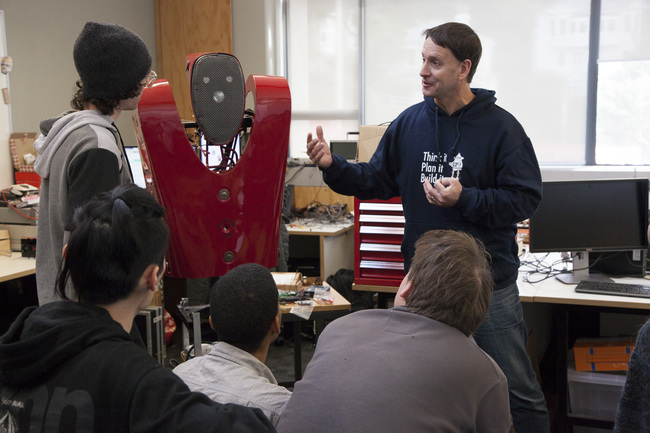 The Faculty of Engineering is pleased to announce that the Dean’s List 2016 has been published.
Introduced in 2011, the Dean's List celebrates academic excellence for students enrolled in an undergraduate degree at Victoria University, with each faculty preparing its own list.
Dean of Engineering, Professor Dale Carnegie, says the Engineering Dean’s List is a way of recognising exemplary student achievement within the Faculty.
“We are very proud of the considerable efforts of our students and congratulate each and every one of them who has been included on the Dean’s List 2016”, says Professor Carnegie.
“The list is a formal, published record of excellence within Victoria University and recognises the hard work, dedication and commitment to academic success that we encourage in all our undergraduate students.
“These students are now well-prepared for further study within the faculty and I am confident that this academic discipline shown early on will lead them into successful careers at the forefront of global technology.”
Engineering: Dean's List 2016
Ade-Simpson, Holly
The Faculty of Engineering is pleased to announce that the Dean’s List 2016 has been published.
Introduced in 2011, the Dean's List celebrates academic excellence for students enrolled in an undergraduate degree at Victoria University, with each faculty preparing its own list.
Dean of Engineering, Professor Dale Carnegie, says the Engineering Dean’s List is a way of recognising exemplary student achievement within the Faculty.
“We are very proud of the considerable efforts of our students and congratulate each and every one of them who has been included on the Dean’s List 2016”, says Professor Carnegie.
“The list is a formal, published record of excellence within Victoria University and recognises the hard work, dedication and commitment to academic success that we encourage in all our undergraduate students.
“These students are now well-prepared for further study within the faculty and I am confident that this academic discipline shown early on will lead them into successful careers at the forefront of global technology.”
Engineering: Dean's List 2016
Ade-Simpson, Holly
Baker, Jaiden
Barnett, David
Barnett, Logan
Bennett, Bryn
Blair, Riley
Byrne, Liam
Campbell, Bob
Carr, Jonathan
Chin, Janice
Chong, Dylan
Clay, Gareth
Cooper, Davis
Craighead, Hannah
Curry, Ryan
Dennis, Liam
Diputado, Eric
Dobbie, David
Edwards, Tom
Fuge, Thomas
Greenwood-Thessman, James
Hack, David
Hammond-Blain, Matt
Hanna, Brady
Huang, Joely
Inkster, Luke
Klapaukh, Benjamin
Li, Callum
Liang, Megan
Libunao, Maria
Matchett, Matt
Miller, Chelsea
Moody, Connor
Moshi, Ewan
Muller, Brandon
Palado, Gabie
Patel, Divya
Pearson, Will
Phillips, David
Phillips, Tessa
Robinson, Jack
Russell, Ben
Sanson, Jamie
Savill, Patrick
Schurhammer, Julian
Singh, Harman
Solomon, Rhaz
Steffensen, Callen
Tildesley, Joe
Yang, Rock
Young, Dan
Software engineer wins top student award
10 Apr 2017 - 09:06 in Achievement
Victoria University of Wellington graduand Jack Robinson has won the Institute of Professional Engineers New Zealand (IPENZ) Ray Meyer Medal for Excellence in Student Design.
The 22-year-old was awarded the prize at a ceremony last week for his final year project. His project simplifies the creation of traffic management plans for roadwork sites.
“Whenever a contractor or event organiser would like to conduct work or hold an event on, or near a road they have to complete a Temporary Traffic Management Plan (TTMP). These are ten page documents often with hand drawn diagrams of the site,” says Jack.
“My project moves the whole process online and makes it much easier. Users can specify work sites on a Google Maps-like page and generate a fully contextual work site.”
The Ray Meyer Medal is IPENZ’s top award for students, and aims to encourage a new generation of innovative engineering designers.
The judges said Jack stood out as a clear winner of this award, with a well-presented project that had excellent commercial potential. They also commented on the excellent level of user-testing that Jack had engaged in.
Jack’s project was supervised by Professor Dale Carnegie, Dean of Victoria’s School of Engineering and Computer Science and senior lecturer Dr David Pearce.
“Jack was very motivated from the beginning and worked hard throughout the project,” says Professor Carnegie. “The award is great recognition of the work he has done—one that solves a real world problem. Jack displays all of the qualities we hope to instil in our Engineering graduates.”
Jack, who is now working as a graduate developer at Xero, will graduate with his Bachelor of Engineering with Honours in Software Engineering in May.
This topic: Main > NewsArchive
Topic revision: 20 Jul 2018, christo
Topic revision: 20 Jul 2018, christo
